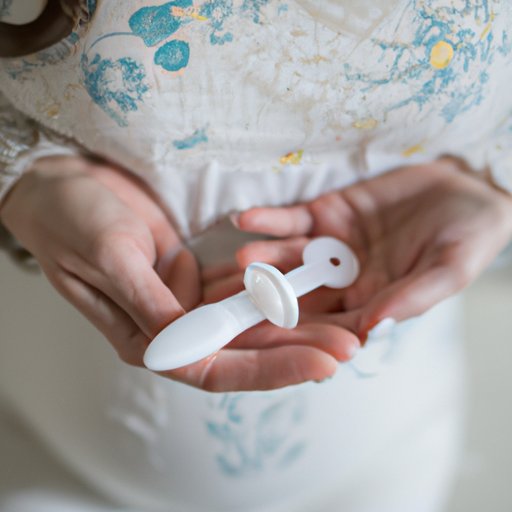I. Introduction
Conceiving a child can be a complex process, and many women often wonder whether it is possible to get pregnant when they are not ovulating. Quite frankly, this is a common question that has been asked over and over again, and unfortunately, the answer is not as straightforward as we’d like it to be. This article will examine the topic of getting pregnant when you are not ovulating and discuss how to increase your chances of conception.
II. Myths and Truths: Debunking Popular Beliefs about Getting Pregnant Without Ovulating
There is a lot of misinformation surrounding the topic of pregnancy and ovulation. For instance, it is commonly believed that a woman cannot fall pregnant if she is not ovulating, which is not entirely true. Although ovulation is the most optimal time for conception, sperm can survive in the female’s reproductive tract for up to five days, meaning that a woman can still become pregnant if she has recently had sex before ovulating.
Another common myth is that the withdrawal method is a reliable form of birth control, although research has shown that it can lead to unwanted pregnancy. The pullout method relies on the discipline of the male partner to pull out before ejaculation, and this can be quite unreliable. Furthermore, it’s important to realize that pre-cum or pre-ejaculation can contain sperm, and therefore a woman can still get pregnant, even if the partner does not fully ejaculate.
III. Understanding Your Menstrual Cycle: The Connection Between Ovulation And Fertility
The menstrual cycle is the body’s natural process of preparing for pregnancy. The cycle is divided into three stages, the follicular phase, ovulation, and luteal phase. Ovulation is the process whereby a mature egg is released from the ovary and travels down the fallopian tube, primed for fertilization by sperm procreation. It is during this fertile period that women stand the best chance of getting pregnant. Knowing when you are ovulating is an essential step in getting pregnant, and many women make the mistake of assuming that they ovulate on day 14 of their menstrual cycle. However, it’s important to note that most women do not ovulate at the same time every cycle, and timing of ovulation varies for each individual.
There are several ways to identify ovulation with accuracy. Firstly, a woman can use an ovulation monitoring kit, which measures hormones in the urine that indicate the onset of ovulation. Secondly, monitoring basal body temperature can also be used to identify the fertile window. Women often experience a slight increase in body temperature following ovulation, indicating the optimal time for conception. Lastly, a woman can track changes in cervical mucus to determine when she’s most fertile as the mucus is egg-white and stretchy during ovulation.
IV. Fertility Awareness Methods: Tips To Help You Track Your Ovulation Cycle
Fertility awareness techniques are methods that allow women to monitor their menstrual cycle and determine when they are most likely to get pregnant. These techniques are quite effective and encompass several approaches, including cervical mucus monitoring, basal body temperature measurement, and calendar methods. The calendar method involves recording the length of your menstrual cycles over several months, subtracting 18 from the length of your shortest cycle, and observing the resulting number as the first possible day of ovulation. Keep in mind that this approach is not highly accurate and should be used in conjunction with other methods.
Making use of technology can also assist in fertility awareness. Many apps have been developed to help women track their menstrual cycles, ovulation, and even predict the sex of the child based on various fertility signs. However, it is important to recognize that technology has its limitations and should not be solely relied upon for contraception and pregnancy planning.
V. Challenges of Conception: Exploring the Factors That Affect Pregnancy and Ovulation
Several factors can affect fertility and ovulation, making it challenging for some women to conceive. One major factor that affects fertility is age. As women get older, the quality and quantity of eggs decrease, resulting in a lower chance of conception. Other factors that can affect ovulation include hormonal imbalances, stress, and a poor diet. Health conditions that affect fertility include polycystic ovary syndrome (PCOS), endometriosis, and thyroid disorders.
It’s important to make improvements to your lifestyle, such as eating a healthy diet, reducing alcohol, and caffeine consumption, and quitting smoking. Exercise is also a significant contributor to improving fertility and general health, although intense exercise can negatively affect ovulation. Furthermore, managing stress levels can significantly impact fertility rates. Activities like yoga, meditation and connecting with friends and loved ones can be helpful in reducing stress levels.
VI. Infertility Causes and Solutions: A Guide to Help Overcome Ovulation-Related Barriers to Pregnancy
Struggling with fertility issues can be a stressful and difficult experience. However, several treatment options are available to increase your chances of conception. If you have been trying to conceive for over a year and haven’t succeeded, consulting with a fertility specialist is a recommended approach. They will review your medical history to identify any underlying conditions that may be contributing to your fertility. Treatment options typically include fertility medications, assisted reproductive technologies, and surgery.
Another effective approach to managing fertility-related problems is taking supplements, such as folic acid and Zinc. These nutrients help to support the healthy development of the fetus, boost fertility and improve your health as a woman.
VII. Conclusion
In conclusion, getting pregnant when you are not ovulating is technically not possible. However, there is still a timeline of five days when the sperm can survive in the reproductive system, meaning that a woman can still get pregnant even without ovulating. Understanding the menstrual cycle, identifying the fertile period, and consistency in fertility awareness methods, can significantly increase your chances of getting pregnant. If you’re struggling to conceive, it’s important to seek professional help and support and make positive lifestyle changes covering diet, exercise, stress reduction, and avoiding unhealthy habits like smoking and high alcohol intake.
